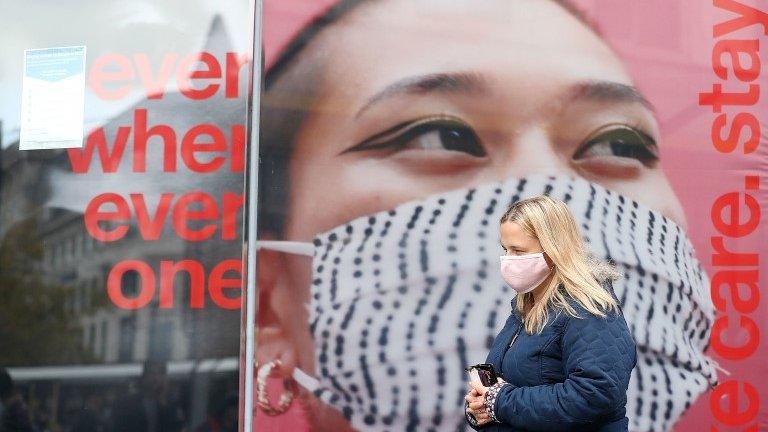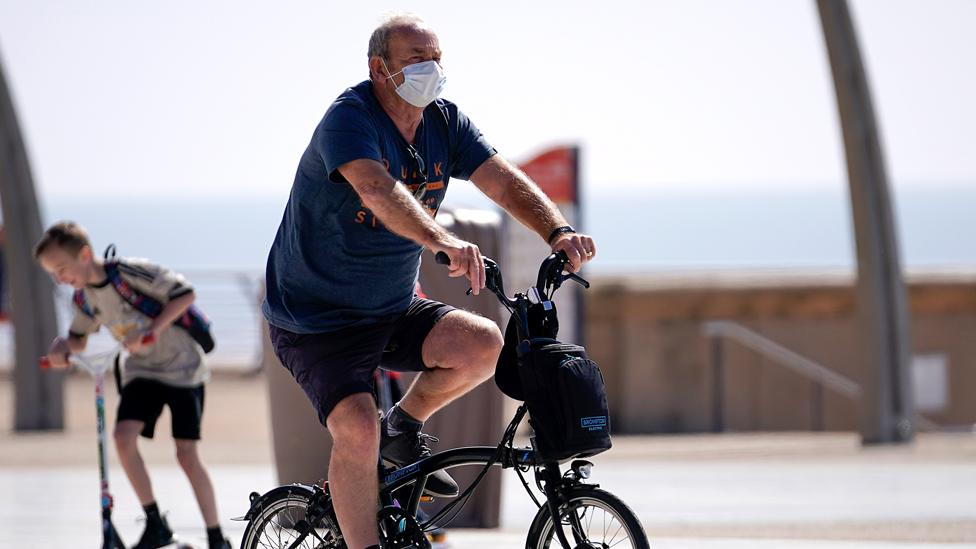Covid-19: Andy Burnham urges Boris Johnson to break Greater Manchester 'impasse'
- Published
Andy Burnham: "This is not just Greater Manchester's fight"
Greater Manchester's mayor has called on Boris Johnson for help in "breaking the impasse" over stricter Covid-19 curbs in the region.
Andy Burnham said in a letter to the PM and other party leaders that Parliament should hold an urgent debate to end the deadlock.
Later the mayor said he had a "constructive call" with Mr Johnson's chief strategic adviser.
Earlier, minister Michael Gove said: "We hope to agree a new approach."
Mr Gove said the government wanted the best for Greater Manchester and that he hoped "we can find a way through together".
But he criticised what he described as the "incoherence" of politicians in that region and warned that if an agreement could not be reached the government would "look at" having to impose restrictions.
Leaders in Greater Manchester, including Mr Burnham, have rejected a move to England's tier three alert level without better financial support.
Prime Minister Boris Johnson has said he may "need to intervene" if local leaders do not accept a move to tier three curbs.
A further 16,982 people tested positive for the virus as of Sunday, the Department of Health figures showed, with a further 67 deaths occurring within 28 days of a positive test.
Scottish First Minister Nicola Sturgeon tweeted that the figure for positive Covid cases in Scotland should be "treated with some caution" due to "a delay within the UK lab system". Cases rose by 316 in Scotland with no further deaths recorded.
The UK government said there was no capacity issue at a Lighthouse laboratory in Glasgow and that rerouting of tests to other laboratories was routine practice.
Mr Burnham has said he would be "ready to speak to the prime minister at any time" to discuss the situation. The mayor's spokesman confirmed Mr Burnham had spoken to Sir Edward Lister, a No 10 official, in a phone call on Sunday afternoon.
In the letter, Mr Burnham said the prospect of tier three - very high - restrictions on hospitality and other areas "is not just a Greater Manchester issue".
He wrote: "Establishing clear national entitlements of the kind we had during the first lockdown will create a sense of fairness which in turn would help build public support for, and compliance with, any new restrictions."
"As leaders of the main political parties in Westminster, I urge you to work together to help resolve this current dispute and establish a fair financial framework for local lockdowns that the whole country will be able to support," he added.


In the language of negotiation, it seems the government and mayor of Greater Manchester may have stepped back from the brink.
Both sides softened their tone in interviews this morning, there was talk of ending the war of words and finding a new way through.
But it's important to remember this is not just a two-way row.
The most telling intervention of the last 24 hours has not been from Andy Burnham or Michael Gove, but the senior Conservative MP Sir Graham Brady.
He represents a constituency in the region and says MPs, council leaders and mayor are "united" across party lines in resisting tier 3 restrictions.
So, while the argument plays out in public between the government and Mr Burnham, it may be won or lost in private between ministers and their own backbenchers whose support is crucial to the government's approach.

Earlier, Mr Burnham told the BBC's Andrew Marr Show there had been "exaggeration" by the prime minister of rising case numbers in Greater Manchester.
Mr Johnson said on Friday cases in the region had doubled over the previous nine days. Mr Burnham said that while cases were "up slightly" they were "certainly not doubling every nine days".
Sir Graham Brady, a senior backbench Conservative and MP for Altrincham and Sale West in Greater Manchester, described the region's Labour and Tory MPs as "pretty united" and said positive tests were "flattening".


The latest data on infection rates in the city of Manchester itself show they have fallen slightly, to around 458 cases per 100,000 of the population.
Across Greater Manchester as a whole - which includes another nine boroughs including Salford, Stockport and Bury - the infection rate is slightly up.
So it is a mixed picture, but the region as a whole is still a long way off other areas such as Derry, Nottingham and Liverpool.
But in many ways it is not the infection rate that matters. What counts are the number of people who are falling so seriously ill they end up in hospital.
We know that lots of otherwise fit and healthy students falling ill with Covid-19 is not going to have a significant impact on the local health service, but lots of older people falling ill would change the picture quickly.
Last week it was reported that, in Liverpool, around 95% of intensive care beds were occupied.
But Greater Manchester Mayor Andy Burnham told the BBC on Sunday morning there were only 64 occupied beds in the city region.
Across Greater Manchester, leaders accept there is a serious problem. But they question whether it is serious enough to warrant the kind of economic impact - not to mention the effect on people's mental health - that moving to tier three - very high - would have.

Mr Burnham also described "side deals" with councils in regions moving into tier three - very high - as not "good enough for me".
Liverpool City Region's metro mayor Steve Rotherham announced, external his area will receive an additional £44m and a similar package worth £42m was given to local leaders in Lancashire.
"Let's remember, the places they're trying to close in tier three - pubs, bookies, gyms - these are places where people are on low wages. And what we're saying is you cannot take away their place of work and not give them support," Mr Burnham said.
He called on the government to re-introduce the 80% furlough scheme used previously in the pandemic to support the low paid affected by tier three closures. Currently, a less generous scheme to provide two-thirds of wages is on offer.
The Labour mayor added: "The truth is health, protecting health, is about more than controlling the virus."

TEST AND TRACE: How does it work?
THREE TIERS: How will the system work?
SOCIAL DISTANCING: Can I give my friends a hug?
TESTING: How do I get a virus test?

A letter from Tory MPs representing areas on the lowest tier of England's Covid alert system called on Mr Burnham to accept a move to tier three - very high - rather than allow national restrictions through a so-called "circuit-breaker".
"It does not make sense to shut down the whole country when the virus is spiking in particular locations," it said.
But four Conservative MPs representing seats in Greater Manchester hit back, describing the letter as "deeply disappointing... unnecessary and ill-advised", "neither wanted nor helpful" and a "No 10 approved communication".
And Mr Burnham said: "I'm not sure a sort of 'we're alright, Jack' letter from a group of southern Conservative MPs is going to cut much ice [in Greater Manchester]."
Meanwhile, Prof Jeremy Farrar, a scientific adviser to the government, said Christmas will be "tough" this year with traditional family celebrations unlikely.
"Christmas will be tough this year. I don't think it's going to be the usual celebration it is and all families coming together, I'm afraid," he told Sky News.
"I think we have to be honest and realistic and say that we are in for three to six months of a very, very difficult period."
But the Wellcome Trust director said there is "light at the end of the tunnel", as he believes a Covid-19 vaccine and effective treatment will be ready in the first quarter of 2021.

THE NEXT MUST-SEE DRAMA IN LOCKDOWN: The Salisbury Poisonings
ONLINE REHEARSALS: Tennant and Sheen continue rehearsals at home

- Published18 October 2020

- Published16 October 2020
